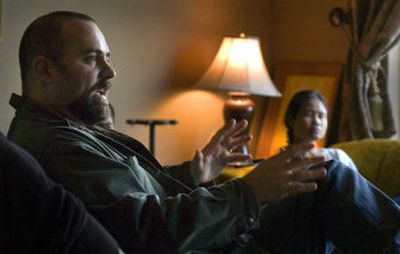Mission of mercy

An East Central Neighborhood pastor and his wife are having a few extra guests for Thanksgiving dinner this year, an extended family of 12 Burmese refugees.
The Rev. Eric Blauer and his wife, Lee Ella, are sponsoring the ethnic Karen (pronounced Ca REN) family, which settled in Spokane in the fall after spending nine years in a Thai refugee camp.
They are here with the help of World Relief, a church-based refugee-aid network.
“It’s a mission in reverse for us,” said Eric Blauer, pastor of Jacob’s Well, a nondenominational ministry at 3016 E. Fifth Ave.
Blauer’s brother Matt is a videographer who documents the ordeal of the Karen and other Southeast Asian refugees for various nongovernmental organizations, including the Free Burma Rangers.
“For us, it is an intense emotional link,” Blauer said. “The people he is helping there are the people we are helping here.”
The government of Myanmar – so named by its military rulers who usurped the authority of Burma’s elected leaders – is one of the most repressive in the world, according to international human rights groups.
The three families the Blauers are supporting give testimony to the barbarity of the government, which calls itself the State Peace and Development Council.
The elder of the Spokane Karen goes by the English-language name he has given himself, Moon Light. He has a limited understanding of English and speaks through an interpreter on important matters.
His wife, Yoo Yoe, 36, is one of three sisters, each with a family, who now live in rental homes in east-central Spokane. The three families have a total of six children.
It will be interesting, the Blauers said, to see what the Karen think of Thanksgiving dinner, with all the trimmings. Refugee camp diet consisted of only rice, salt and a paste of fermented fish.
According to Sandi Solverson, a tutor at Sheridan Elementary School, the older Karen children have been “hesitant about our food.” But that is not the case for Moon and Yoo’s youngest child, Larde, who is 7.
“She tries everything,” Solverson said.
More problematic is getting the children to remember their coats, she said, since where they come from it rarely gets below 90 degrees. Socks also were an issue for a while.
The story of Moon Light and his family is typical of thousands of Burmese refugees, according to Stephen Dun, of World Aid Inc., a Seattle-based humanitarian organization that sends aid to areas of the world that larger relief agencies do not.
Dun often interprets via telephone for the Karen families in Spokane.
Born in Hmaw Bi, about 30 miles north of Rangoon, Moon Light, now 41, farmed and tended a shop in Htmor in the Karen region of the country until 1996. That year everyone in his village was given three days to leave their homes or come under mortar attack by the Myanmar army.
Between 1996 and 2005, more than 2,800 villages like Moon’s were destroyed by the army, which is dominated by ethnic Burmans, the largest of several ethnic peoples that constitute the former Burma.
In many cases, the villagers are relocated to what are essentially forced labor camps where their rice is rationed while they toil as slaves, according to the Thailand Burma Border Consortium and other human rights organizations.
People found in “black zones” outside areas approved by the army are assumed to be resistance fighters or sympathizers and are shot or mortared on sight – whether man, woman or child, according to Dun, who cited human rights reports.
In addition, the Myanmar army, a force of more than 300,000 troops, has institutionalized rape as a means of ethnic cleansing of non-Burmans, according to Dun and Earthrights International.
In 1996, the Myanmar Oil & Gas Enterprise, in cooperation with the U.S. oil company Unocal and the French company Total, was building a multibillion-dollar natural gas pipeline from offshore deposits in the Gulf of Martaban overland to power plants in Thailand.
The army destroyed villages, including Moon’s, in the pipeline’s path and conscripted their inhabitants as forced labor, according to EarthRights International.
Last year Unocal, which has merged with Chevron Corp., agreed to compensate Burmese villagers who sued the company for its alleged complicity in crimes against humanity, including forced labor, rape and murder, according to EarthRights International.
The settlement is the result of two lawsuits filed under the Alien Tort Claim Act, which was enacted in 1789 to prosecute pirates. The law was reinstated in 2002 to allow corporations to be prosecuted in U.S. courts for violations of international law.
Moon and his wife, her sisters and their families fled into the jungle, where they eked out an existence for 13 months, finally ending up in Tham Hin refugee camp in Thailand, which shelters more than 9,000 Burmese citizens.
Meanwhile, World Relief is helping Moon find work. The Blauers hope Moon and his extended family will be the first of other Burmese Karen to find their way to Spokane from Tham Hin, where many friends and relatives remain.
Though it has been a challenge, taking them in has been “a great experience for our family,” Blauer said.
In May, U.S. Secretary of State Condoleezza Rice granted a waiver allowing the Tham Hin refugees to resettle in the United States provided they are not members of the Karen National Union, a resistance movement the United States regards as a terrorist organization.